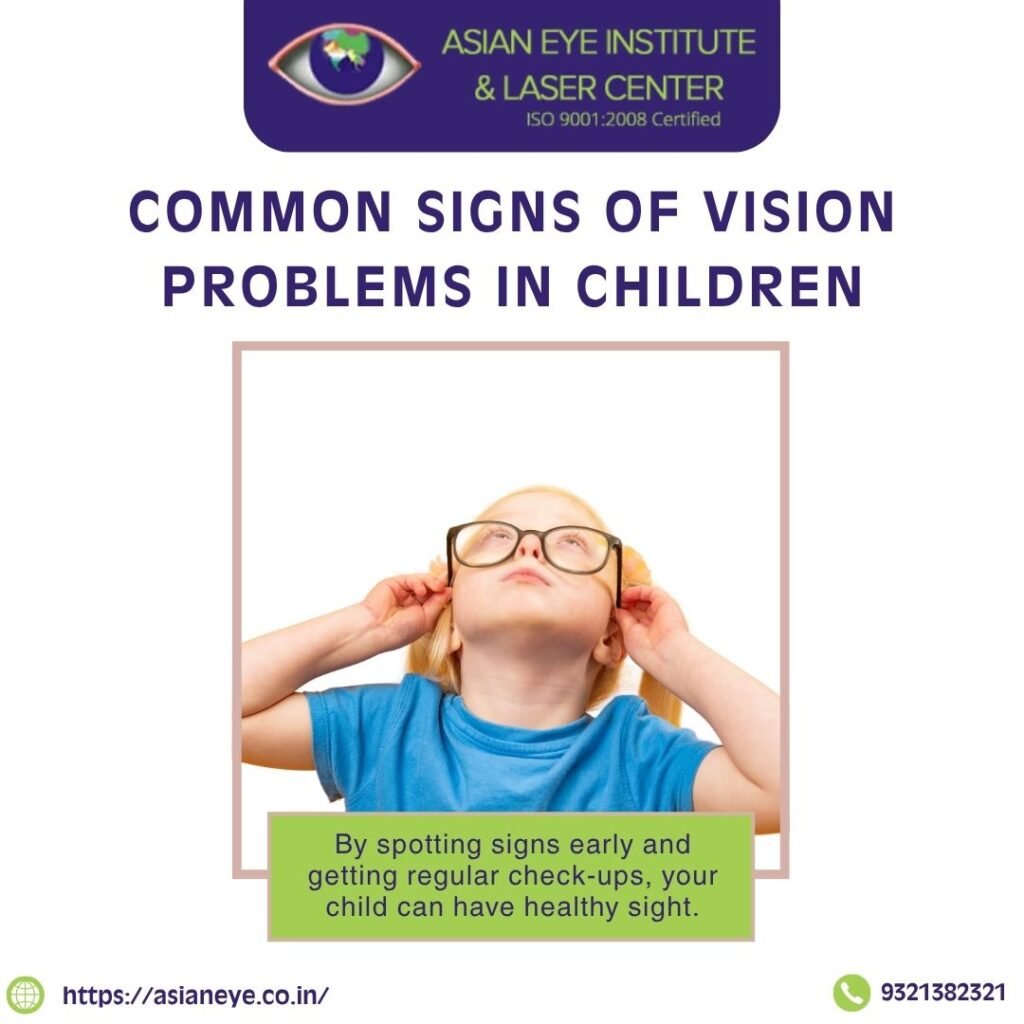Children often don’t know how to express that they’re having trouble seeing. To them, blurry vision or double images might feel normal because they don’t know what “clear” is supposed to look like.
That’s why identifying vision problems in kids early is critical. Detecting issues before they worsen can help with:
- Academic performance
- Physical coordination
- Overall development
- Long-term eye health
Why It’s Easy to Miss Vision Issues in Kids
Kids adapt quickly. If they can’t see clearly from one eye, they might just rely on the other. And unless vision loss is severe, they might not say anything at all.
Parents and teachers often notice the signs first — not the children themselves.
10 Common Signs of Vision Problems in Children
1. Frequent Squinting
Squinting helps temporarily improve focus. If your child does this often, especially when reading or watching TV, it may point to refractive errors like myopia or astigmatism.
2. Sitting Too Close to Screens
If your child always chooses the front row or holds tablets/books very close, it might be because they can’t see clearly from a distance.
3. Complaints of Headaches or Eye Pain
Frequent headaches, especially after screen use or reading, could mean eye strain or focusing issues.
4. Clumsiness or Bumping Into Objects
If your child frequently trips, bumps into furniture, or struggles with sports, they might have depth perception or peripheral vision problems.
5. Struggling with Schoolwork
Vision issues can lead to trouble reading, writing, and concentrating — often mistaken for learning disabilities or ADHD.
6. Short Attention Span During Reading
Losing interest in reading quickly could be because the words appear blurry or double — not because of a lack of focus.
7. Frequent Eye Rubbing or Blinking
These are signs of eye fatigue, dryness, or even allergies — but if persistent, it may also suggest vision problems.
8. Misaligned or Wandering Eyes
One eye turning inward, outward, or upward could indicate strabismus (crossed eyes), which needs early correction.
9. Tilting Head or Covering One Eye
Children may tilt their head to compensate for a weak eye. Covering one eye while reading or watching something may also indicate double vision.
10. Light Sensitivity or Watery Eyes
Excessive tearing or avoiding bright light might be a sign of photophobia, eye strain, or undiagnosed inflammation.
📸 Visual Suggestion:
Before-and-after illustration of a child struggling to see clearly, then happy after wearing glasses.
When to See an Eye Specialist
If your child shows one or more of these signs, it’s a good idea to schedule an eye exam with a pediatric ophthalmologist.
Doctors recommend:
- First exam at 6 months
- Next at 3 years
- Just before starting school (age 5–6)
- Then every 1–2 years
At Asian Eye Hospital, We Make Eye Exams Child-Friendly
At Asian Eye Hospital & Institute, we specialize in pediatric eye care with:
- Kid-friendly diagnostic tools
- Advanced tests for refractive errors, strabismus, and lazy eye
- Myopia control and vision therapy
- Personalized care plans for long-term eye health
📸 Visual Suggestion:
Smiling child with colorful glasses and a pediatric eye specialist using a toy-shaped eye test machine.
FAQs Parents Often Ask
Q: Can screen time cause vision problems in kids?
Yes. Too much screen time can lead to digital eye strain and even accelerate myopia progression.
Q: Are vision problems common in toddlers?
Absolutely. Issues like lazy eye and squint often begin early and can go unnoticed without an exam.
Q: Do kids always need glasses for vision problems?
Not always — some may benefit from vision therapy, patching, or special lenses depending on the issue.
Final Thoughts
Your child’s success at school, play, and everyday life depends on clear vision. By spotting signs early and getting regular check-ups, you’re setting them up for a lifetime of healthy sight.
Concerned About Your Child’s Eyes?
Book a child-friendly eye check-up at Asian Eye Hospital today. Let’s ensure your little one sees the world as clearly and beautifully as they should.
Locations: Borivali, Dadar, Ulwe, Virar, Kutch
+91 98673 03918 | +91 93213 82321

